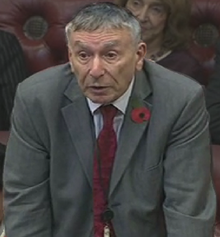Maurice Peston, Baron Peston
The Lord Peston | |
|---|---|
 In the House of Lords in 2014 | |
| Member of the House of Lords as Baron Peston | |
| In office 24 March 1987 – 23 April 2016 | |
| Personal details | |
| Born | 19 March 1931 London, England |
| Died | 23 April 2016 (aged 85) |
| Spouse(s) | Helen Conroy (m. 1958) |
| Children | 3 including Robert Peston |
| Parent(s) | Abraham Peston Yetta Malt |
| Alma mater | |
| Occupation | Economist and Labour life peer |
Maurice Harry Peston, Baron Peston (19 March 1931 – 23 April 2016[1]) was a British economist and Labour life peer.[2] His research interests included macroeconomic policy and the economics of education.[3]
Personal
[edit]Peston was born in 1931 in London, the son of Abraham Peston, a "pleater" in the garment trade,[4] and Yetta R. (née Malt) Peston. He was educated at Belle Vue Boys' School, Bradford, West Yorkshire,[2] and Hackney Downs School. He graduated from the London School of Economics and undertook postgraduate study at Princeton University. He married Helen Conroy in London in 1958.[5]
The couple believed passionately in state education, and sent all of their three children to the local comprehensive, Highgate Wood School, Crouch End, north London.[6] One of their children is the journalist Robert Peston, currently ITV's political editor.
Career
[edit]Academia
[edit]Peston founded the economics department at Queen Mary College, London, and advised various government departments and Labour Secretaries of State from the 1960s through to the 1990s.[7] He remained an Emeritus Professor of Economics at the College until his death in 2016.[3]
House of Lords
[edit]Peston was created a life peer as Baron Peston, of Mile End, in Greater London, on 24 March 1987.[8] He immediately became Opposition Spokesperson for Energy (until 1997) and Education & Science (until 1997).[9] He served as Opposition Spokesperson on the Treasury (1990–92) and Trade & Industry (1992–97).[9] He chaired the House of Lords Offices Refreshments Sub-committee from 1993 to 1997.[9]
When Labour took over government, he chaired the influential House of Lords Committee on Economic Affairs from 1998 until 2005.[9] Since then he worked on the Lords Constitution Committee, and on the committee reviewing the BBC Charter.[9]
Other interests
[edit]He was chairman of the Pools Panel during the 1990s, adjudicating on the expected results of football matches in case any were postponed.[10]
Lord Peston was a patron of the British Humanist Association,[11] as well as an Honorary Associate of the National Secular Society. In the House, he spoke candidly about his existential views, describing himself as someone "who regards all religious belief as failing to meet even the most elementary epistemological and deontological criteria".[11]
References
[edit]- ^ Hattersley, Roy; Keegan, William (26 April 2016). "Lord Peston obituary". The Guardian.
- ^ a b Burke's Peerage, Baronetage & Knightage, 107th edition, 3 volumes. Burke's Peerage (Genealogical Books) Ltd. 2003. Retrieved 5 November 2014.
- ^ a b "Department of Economics". Queen Mary College, London. 22 July 2008. Archived from the original on 29 May 2008. Retrieved 9 December 2008.
- ^ "Lord Peston obituary". TheGuardian.com. 26 April 2016.
- ^ "Lord Peston – obituary". The Telegraph. 24 April 2016.
- ^ Grice, Elizabeth (24 January 2008). "Robert Peston: 'I'm not going to become smooth and phoney'". London, UK: The Telegraph. Archived from the original on 25 March 2008. Retrieved 8 October 2008.
- ^ Peston, Maurice (11 January 2004). "Treasure our golden oldies". The Guardian. London, UK. Retrieved 8 October 2008.
- ^ "No. 50879". The London Gazette. 3 April 1987. p. 4493.
- ^ a b c d e "Member Profile – Lord Peston". UK Parliament. Retrieved 9 October 2008.
- ^ Baker, Andrew (27 March 1994). "Almanack: Pools panel draw a veil". The Independent. Archived from the original on 12 May 2022. Retrieved 14 March 2020.
- ^ a b "BHA mourns its patron, Lord Peston". British Humanist Association. 25 April 2016. Retrieved 16 January 2017.
External links
[edit]- Robert Peston: My late father Maurice Peston's influence, bbc.co.uk; accessed 24 April 2016.
- 1931 births
- 2016 deaths
- People from Mile End
- British critics of religions
- People educated at Belle Vue Boys' Grammar School, Bradford
- People educated at Hackney Downs School
- Alumni of the London School of Economics
- Princeton University alumni
- Academics of Queen Mary University of London
- Honorary Fellows of the London School of Economics
- English economists
- Labour Party (UK) life peers
- Peston family
- Members of the Fabian Society
- Life peers created by Elizabeth II
- Jewish British politicians
